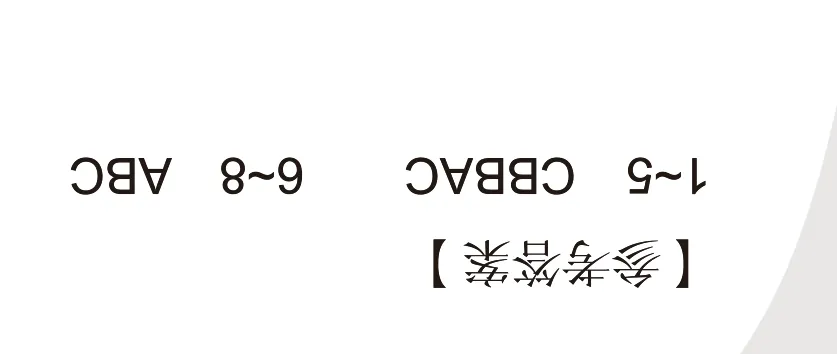疑问句
2022-12-18高洁
高洁
英语中的疑问句分为一般疑问句、特殊疑问句、选择疑问句和反义疑问句四种。
考向一:一般疑问句
所谓一般疑问句,就是可以用yes 或no 来回答的疑问句。
1.肯定形式的一般疑问句
此类一般疑问句的结构为“连系动词be/助动词/情态动词+主语+动词原形+其他”。例:
—Does he go to school by bike? 他骑自行车去上学吗?
—Yes,he does.是的,他骑。/ No,he doesn’t.不,他不骑。
【典例】
—Do you have anything good to suggest?
—______________ .If I have,I will put it on the message.
A.Yes,I have B.No,I haven’t
C.Yes,I do D.No,I don’t
【答案】D
【解析】句意:——你有什么好的建议吗?——没有。如果有的话,我就给你留言。根据句意可知,用no 作否定回答;have 是实义动词,回答时要借助于助动词do。故选D。
2.否定形式的一般疑问句
此类一般疑问句主要表示反问或惊讶,通常在连系动词be、情态动词或助动词后加not 的缩略式n’t,并放在句首。例:
—Aren’t you a writer? 难道你不是作家吗?
—No,I’ m not.是的,我不是。
【注意】在这样的句子中,要注意句子的翻译,yes 翻译成“不”,no 翻译成“是的”。
【典例】
—Isn’t he a teacher?
—______________.He is a reporter.
A.No,he isn’t B.Yes,he is
C.Yes,he isn’t D.No,he is
【答案】A
【解析】句意:——他不是一名老师吗?——是的,他不是(老师),他是一名记者。由答语可知他不是老师。故选A。
3.用yes、no 之外的词回答的一般疑问句
一般疑问句也可用其他表示肯定或否定的词回答,如:certainly、sure、of course、I think so、all right、certainly not、not at all、never、sorry、not yet、I’ m afraid not 等。例:
—Would you mind my joining your talk? 我加入你们的讨论,你们介意吗?
—Of course not.当然不介意。
【典例】
—Would you please help me with my writing skills?
—______________.You can come to my office every Saturday.
A.That’s all right B.Not at all
C.No problem D.No,thanks
【答案】C
【解析】That’s all right 表示“没关系”,Not at all 意为“不用谢”,No problem 是“没问题”,No,thanks 则表示“不,谢谢”。根据答语“你可以每周六来我办公室”可知可以帮忙。故选C。
考向二:特殊疑问句
以疑问词开头的疑问句叫特殊疑问句,特殊疑问句的基本结构是“疑问词+一般疑问句”。常见的疑问词有what、who、whose、which、when、where、how、what time、what color、how much、how many、how long、how often、how soon 等。
1.特殊疑问句的语序
疑问词作主语时,句子的语序与陈述句的语序相同。当疑问词作句子的宾语、状语等时,应用“疑问词+一般疑问句”结构。例:
Who will give us a talk? 谁将给我们做报告?(who 作主语)
When do you get up every day? 你每天什么时候起床?(when 作时间状语)
【典例】
到目前为止你看了多少部英文电影?(根据所给中文意思完成句子)

【答案】How many English films have you seen
【解析】film 意为“电影”,是可数名词,“多少部英文电影”应用how many English films 表示,由so far 可判断出要用现在完成时。
2.否定形式的特殊疑问句
否定形式的特殊疑问句由“疑问词+一般疑问句的否定形式”构成,主要表示劝告、建议或责备等。例:
Why didn’t you tell me earlier? 你为什么不早点告诉我呢?
When can’t he come? 他什么时候不能来?
3.对画线部分提问
这类题实际上就是将所给的陈述句变为特殊疑问句。解这类题时通常分三步完成:选准疑问词,改为疑问句语序,抄写剩余的部分。当对句子的主语提问时,其语序是“疑问词 + 谓语 + 其他成分”。例:
Jack is over there.
→Who is over there?
He comes to China once a year.
→How often does he come to China?
【典例】
Lucy will leave for London on business in three hours.(对画线部分提问)________ ________ will Lucy leave for London on business?
【答案】How soon
【解析】“in+时间段”常与一般将来时连用,对此提问要用how soon,表示“多久”。
考向三:选择疑问句
对两种或两种以上的情况进行选择的问句叫选择疑问句。选择疑问句的最后两个供选择部分用or 连接。选择疑问句有两种:一般选择疑问句和特殊选择疑问句。例:
— Which do you like best,apples,oranges or bananas? 你最喜欢哪样,苹果、橘子还是香蕉?
—I like apples best.我最喜欢苹果。
【注意】选择疑问句不能用yes 或no 来回答。
【典例】
—Which would you like,Coke or tea?
— __________ .I prefer coffee.
A.Neither B.Both
C.Either D.None
【答案】A
【解析】本句为选择疑问句,问句中提供了Coke 与tea,而答语中只出现了coffee,由此可判断出这是对两者的否定,故用neither。
考向四:反义疑问句
1.反义疑问句的特点
反义疑问句由两部分构成:前一部分是对事物的陈述,后一部分是简短的提问,即“陈述句+附加疑问句”。反义疑问句前后两部分必须遵循的原则是“三同一反”,即人称相同、动词相同、时态相同、肯否相反(前肯后否、前否后肯)。例:
Mary is a worker,isn’t she? 玛丽是工人,是不是?
You won’t go to the Summer Palace tomorrow,will you? 明天你不去颐和园,是吗?
【典例】
—He’s never been to Canada before,__________ ?
—Sorry,I don’t know.
A.is he B.has he
C.isn’t he D.hasn’t he
【答案】B
【解析】句意:——他以前从来没有去过加拿大,是吗?——抱歉,我不知道。反义疑问句要遵循“肯否相反”的原则,因为前面有否定词never,且前面的’s 是has 的缩写。故选B。
2.反义疑问句的答语
对反义疑问句的回答,不管问题的提法如何,若事实是肯定的,就用yes回答;若事实是否定的,就用no 回答。注意在“前否后肯”的反义疑问句的答语中,yes 意为“不”,no 意为“是”。例:
—He isn’t going to the meeting,is he? 他不去参加会议,是吗?
—Yes,he is.不,他要去。/ No,he isn’t.对,他不去。
【典例】
—You come from England,don’t you?
—__________ .I come from a small town near London.
A.No,I do B.No,I don’t
C.Yes,I am D.Yes,I do
【答案】D
【解析】这里是“前肯后否”型的反义疑问句,根据答语第二句的句意“我来自伦敦附近的一个小镇”可知我的确是从英国来的,与上文事实相符。故选D。
3.常考的反义疑问句
初中阶段常考的反义疑问句有以下几种:
(1)there be 句型构成反义疑问句时,附加疑问句的主语应用there。
(×)There is a cat under the chair,isn’t it?
(√)There is a cat under the chair,isn’t there?
【典例】
There are two libraries in this city,__________?
A.aren’t there B.aren’t they
C.are they D.are two
【答案】A
【解析】对there be...进行反义疑问时,应用be (not) there 的形式构成附加疑问句。
(2)如果陈述句中含有表示否定意义的词,如never、hardly、few、little 等,在构成反义疑问句时,附加疑问句部分需用肯定式。例:
I could hardly see the bird in the sky,could I? 我几乎看不见空中的鸟,对吗?
【典例】
Maria has few friends in China,__________?
A.has she B.doesn’t she
C.does she D.hasn’t she
【答案】C
【解析】 few 意为“很少;几乎没有”,是表示否定意义的词,故本句是“前否后肯”的反义疑问句,时态为一般现在时,主语为第三人称单数,故用助动词does。
【注意】若陈述句部分含有带否定前缀的词,如unhappy、impossible、untrue、dislike 等,应把陈述句看作肯定句,构成反义疑问句时,附加疑问句用否定式。
He dislikes volleyball,doesn’t he? 他不喜欢排球,是不是?
(3)祈使句之后的附加疑问句。
①一般祈使句之后的附加疑问部分常用“will you? ”或“won’t you? ”。
【典例】
Don’t make so much noise,Lily,__________?
A.do you B.don’t you
C.will you D.won’t she
【答案】C
【解析】否定祈使句之后的附加疑问句应用“will you? ”。
②以let’s 开头的祈使句的附加疑问部分常用“shall we? ”,以let us 开头的祈使句的附加疑问部分常用“will you? ”。
【典例】
Let’s go to the cinema to see a film,__________ ?
A.will you B.shall we
C.won’t you D.don’t you
【答案】B
【解析】以let’s 开头的祈使句的附加疑问部分用“shall we? ”,故选B。
(4)主从复合句构成反义疑问句时,附加疑问句部分通常与主句在主谓上保持一致;如果主从复合句为“I (don’t) think/believe+宾语从句”,附加疑问部分应与宾语从句在主谓上保持一致。
I think Tom runs fastest of all,doesn’t he? 我认为在所有人中汤姆跑得最快,对吗?
练习
( )1.— Must I hand in the homework right now?— __________.That’s the rule.
A.Yes,you can. B.No,you can’t.
C.Yes,you must D.No,you mustn’t.
( )2.— __________ I finish my work now?— No,you __________.You can do it later.
A.May,needn’t B.Must,don’t have to
C.Can,couldn’t D.None
( )3.— Hi,Tony! __________ you __________ to the newly-opened shopping mall lately?
— Yes.I went there with my parents last week.
A.Did;go B.Have;been
C.Have;gone D.Do: go
( )4.— __________ will the Paris Olympic Games be held?
— In 2024.
A.When B.How C.Why D.Where
( )5.— Sally,I heard you’re going to America.__________ will you stay there?
— Two whole years.
A.How soon B.How often
C.How long D.None
( )6.— __________ are these bananas?
— Ten yuan.
A.How much B.How long
C.How heavy D.How big
( )7.— Do you know __________ Ann goes to work every day?
— Usually by underground.
A.why B.how C.when D.whether
( )8.— __________ do you go to a movie?
— Twice a week.
A.How long B.How soon
C.How often D.How far

